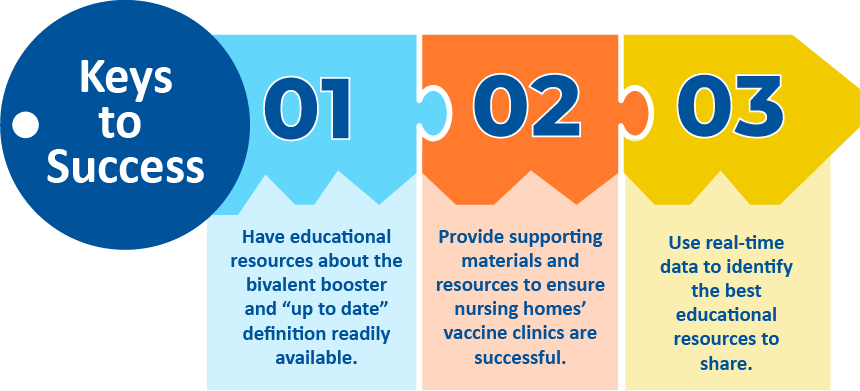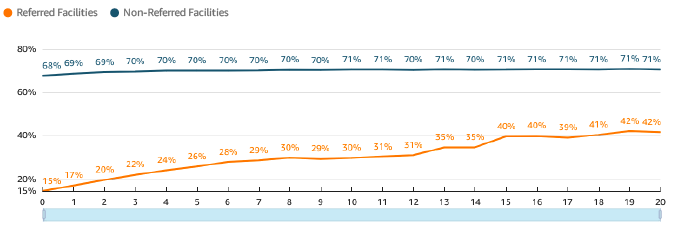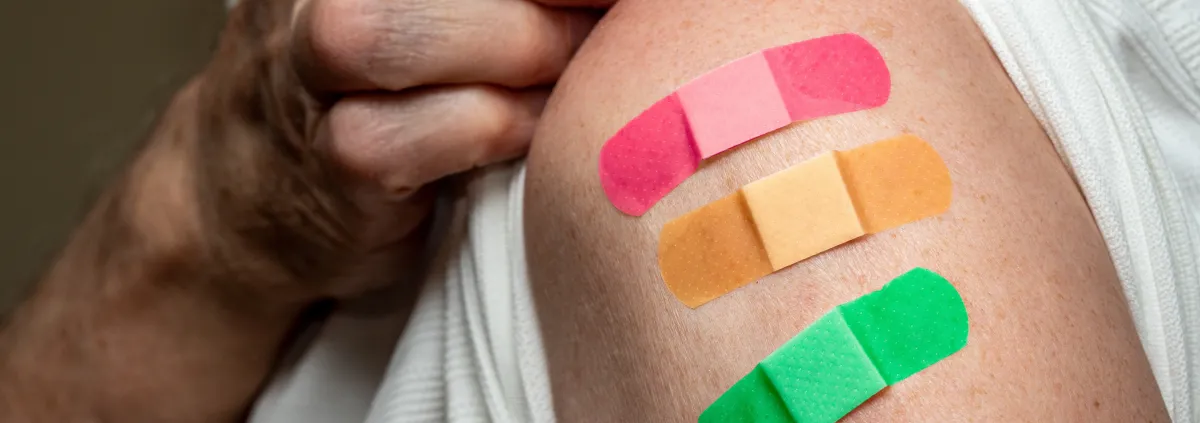A nursing home located in rural Nebraska with an average daily census of 58 residents and a nursing home located in rural Arkansas with an average daily census of 45 were referred by the Centers for Medicare & Medicaid Services (CMS) to TMF, a CMS Quality Innovation Network-Quality Improvement Organization (QIN-QIO), for assistance with improving their resident COVID-19 bivalent booster rate. With TMF’s help, the facilities increased their resident COVID-19 bivalent booster rate by 45.7 percent and 79.5 percent, respectively, from the time the nursing homes were referred to TMF and the last report to the National Healthcare Safety Network (NHSN) in January 2023.
Getting Up to Date about the Up-to-Date Definition
In an initial conversation with the Nebraska nursing home, TMF learned the facility was unaware that the definition of “up to date” on COVID-19 vaccines in NHSN had changed. Staff were also confused about what metrics they were supposed to follow, which led to issues with their NHSN reporting. To help the nursing home better understand the new definition, TMF recommended staff watch the Centers for Disease Control and Prevention’s (CDC’s) Refresher Training: Up to Date Vaccination Status for Long Term Care Facilities. The QIN-QIO also reinforced the facility’s entire vaccination program by sending the following resources:
- Q&A: Resistance to COVID-19 Vaccine Boosters handout
- Why Should I Get a Bivalent Booster information (from the COVID-19 Real Time Learning Network)
- Get Boosted Now poster
- Early Estimates of Bivalent Booster Dose Vaccine Effectiveness in Preventing Symptomatic SARS-CoV-2 Infection Among Immunocompetent Adults (from CDC)
To reinforce vaccine champions in the facility, TMF promoted its Badge Buddy Program. The Badge Buddy is a visual symbol staff wear on their badge to indicate they are vaccinated. There is also a printable quick-reference resource highlighting best practices for infection prevention including donning, doffing and personal protective equipment (PPE).
TMF also learned that the facility felt a sense of urgency to vaccinate its residents. To procure vaccines, the nursing home typically partners with a large, institutional pharmacy company. However, receiving doses often takes time. TMF suggested the facility reach out to a local pharmacy to secure the needed doses.
Rescheduling a Vaccine Clinic to Quickly Vaccinate Residents
In TMF’s initial conversation with the Arkansas nursing home, the QIN-QIO learned the facility delayed hosting a vaccine clinic because the director of nursing (DON) was out of the building. The DON’s presence at the clinic was important because of the good rapport the DON has with the residents. The nursing home was able to quickly reschedule the clinic because of their partnership with a local pharmacy and with the DON’s help get consents signed and residents vaccinated.
To enhance the success of the vaccine clinic, TMF provided the facility with several resources including a vaccination/booster clinic flyer, vaccine clinic checklist, and Be Home for the Holidays and Keep Your Facility Safe During the Holiday Season posters.
Improving the Culture of Promoting Vaccines
Despite both nursing homes having a strong culture of promoting vaccines, the facilities were struggling to get staff vaccinated. To help the facilities overcome this challenge, TMF provided a “Getting to Know You” staffing tool. The QIN-QIO also hosted an Office Hours webinar to help nursing home leadership understand the composition of their staff and learn what motivates and engages them. A Bivalent Vaccine Word Search and Bivalent Vaccine Crossword Puzzle were provided to entertain and educate staff about the importance of COVID-19 vaccinations.
Using Data to Offer Ongoing Education and Support
In addition to the specific resources TMF provided to both facilities, the QIN-QIO also uses Power BI, a data tool that helps ensure the nursing home’s NHSN data stays accurate. The tool allows TMF to see exactly what the facilities are reporting and step in to help if the data appears inaccurate.
TMF also pulls transmission rates within communities. This data, and accompanying posters, are shared with the nursing homes along with recommendations and best practices for PPE, visiting and infection prevention based on the rate. The Nebraska nursing home posts their rate in the facility so visitors are aware and can follow best practice recommendations.
Efforts to increase nursing home vaccine uptake in all nursing homes supported by TMF include offering ongoing education in the form of weekly webinars and office hours, as well as resources about infection prevention, COVID-19 vaccines, etc. Resources are included in the invitations to educational events. Additional efforts include interventions targeted toward facility leadership and staff, one-on-one or affinity group meetings with corporate leadership to discuss vaccine processes, and coding tutorials and data reporting process improvement recommendations for staff.
Keys to Success
TMF’s success helping both nursing homes increase their resident COVID-19 bivalent booster rates can be replicated by taking the following steps:

All nursing homes in the region served by TMF that were referred to the QIN-QIO for assistance between October 16, 2022, and January 8, 2023, saw a 5.5 percent net increase in resident COVID-19 bivalent booster rates as compared to nursing homes in the region that were not referred to the QIN-QIO for assistance. In addition, the percentage of residents who are up to date in nursing homes in the region that were referred to the QIN-QIO for assistance increased by 27 percent, compared to residents who are up to date in nursing homes not referred to the QIN-QIO, which increased by only three percent.
TMF’s Regional Nursing Home Resident COVID-19 Bivalent Booster Rates Including Referrals from October 16, 2022 – January 8, 2023
The graph compares bivalent vaccination rates of CMS-referred facilities (orange) with never-referred facilities (blue) and only includes referrals made between October 16, 2022, and January 8, 2023. Never-referred facilities did not meet initial criteria for booster referral because CMS focused on facilities with significantly lower rates.

This material was prepared by The Bizzell Group (Bizzell), the Data Validation and Administrative (DVA) contractor, under contract with the Centers for Medicare & Medicaid Services (CMS), an agency of the U.S. Department of Health and Human Services (HHS). Views expressed in this material do not necessarily reflect the official views or policy of CMS or HHS, and any reference to a specific product or entity herein does not constitute endorsement of that product or entity by CMS or HHS. 12SOW/Bizzell/DVA-1138-07/18/2023

